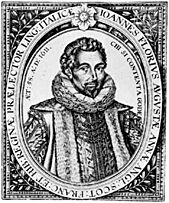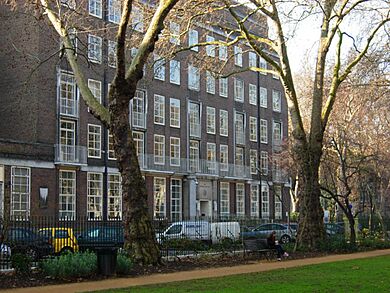Frances Yates facts for kids
Quick facts for kids
Frances Amelia Yates
|
|
|---|---|

Yates in graduation robes, 1924
|
|
| Born | 28 November 1899 Southsea, England |
| Died | 29 September 1981 (aged 81) Surbiton, England |
| Occupation |
|
| Alma mater | University College London, Warburg Institute |
| Subject | History of Western esotericism |
Dame Frances Amelia Yates (born November 28, 1899 – died September 29, 1981) was an English historian. She studied the Renaissance period, which was a time of great change in Europe. Frances Yates wrote many important books about the history of esotericism, which includes old ideas about magic, mysticism, and hidden knowledge.
After finishing her studies in French at University College London, she started publishing her research. She focused on plays from the 1500s and the life of a language expert named John Florio. In 1941, she began working at the Warburg Institute in London. There, she developed a new way of studying history. She called it "Warburgian history." This approach looked at history across different European countries and combined many subjects, like art, philosophy, and science.
Her most famous book was Giordano Bruno and the Hermetic Tradition (1964). In this book, she showed how ideas about magic and mysticism were important in the thinking of people like Giordano Bruno during the Renaissance. Other major books by her include The Art of Memory (1966) and The Rosicrucian Enlightenment (1972). Frances Yates helped make complex ideas about the occult and Neoplatonic philosophies of the Renaissance easier for people to understand.
Contents
Biography
Early Life: 1899–1913
Frances Amelia Yates was born on November 28, 1899. She grew up in Southsea, a town on the coast of southern England. She was the fourth child of James Alfred and Hannah Malpas Yates. Her father worked in shipbuilding for the Royal Navy. He loved to read and made sure his children had many books.
The family moved often because of her father's work. They lived in places like Glasgow and different parts of Yorkshire and Cheshire. Frances's education was not always in a formal school. She was often taught at home by her mother and sisters. Even without regular schooling, she read a lot. She especially loved the plays of William Shakespeare and the poetry of the Romantics. She started writing early, publishing a short story when she was 13. At 16, she wrote in her diary that she must and will write.
Starting Her Career: 1914–1938
The First World War began in 1914. Frances's brother joined the army and was sadly killed in 1915. This event deeply affected her family.
Frances decided to go to university. She moved to Claygate, Surrey, where she lived for the rest of her life. She studied French at University College London. She worked very hard and earned her first degree in 1924. In 1925, she published her first academic paper. She then earned her master's degree in French in 1926. From 1929 to 1934, she taught French at a school, but she preferred to spend her time on research.
While doing research, she became interested in John Florio, an Italian who lived in Shakespeare's England. She wrote a biography about him, John Florio: The Life of an Italian in Shakespeare's England, which was published in 1934. This book received good reviews. Through her work on Florio, she became fascinated by Giordano Bruno. She started to believe that magic and mysticism were very important in Renaissance thinking, not just science.
Working at the Warburg Institute: 1939–1960
In 1939, Frances Yates started writing for the Journal of the Warburg Institute. In 1941, she was offered a job at the Warburg Institute in London. This job allowed her to continue her own research. During the Second World War, she also helped with the war effort by volunteering for first aid.
After the war, Frances Yates and other scholars at the Warburg Institute wanted to change how history was written. They believed history should be "pan-European" (looking at all of Europe) and "interdisciplinary" (combining different subjects). She called this "Warburgian history." She thought this approach would help prevent future wars by promoting understanding across nations.
In 1947, the Warburg Institute published her book The French Academies of the Sixteenth Century. She also started planning a book about Giordano Bruno. Despite losing her mother and sisters during this time, she continued her research. She also gave lectures at different universities. Her book The Valois Tapestries was published in 1959. In it, she offered a new way to understand these famous tapestries.
Worldwide Recognition: 1961–1981
Frances Yates became even more productive in the 1960s and 1970s. She also wrote book reviews for The New York Review of Books.
In 1961, she wrote Giordano Bruno and the Hermetic Tradition. This book is considered her most important work. It showed how "Hermeticism," a type of ancient wisdom, was key to understanding Bruno and Renaissance magic. The book was published in 1964 and brought her international fame. She even went on a lecture tour in the United States in 1965.
Her next book, The Art of Memory, came out in 1966. In 1967, she was made a Fellow of the British Academy. Her book The Rosicrucian Enlightenment (1972) explored the influence of secret societies in 16th-century Europe.
Frances Yates received many honors for her work. She got an honorary doctorate in 1971. In 1972, she was made an Officer of the Order of the British Empire (OBE). In 1977, she was promoted to Dame Commander of the Order of the British Empire (DBE). This meant she was given the title "Dame."
In 1974, a special meeting was held at a library in Los Angeles to discuss her ideas, which were called the "Yates thesis." While her work was highly praised, some scholars also started to question parts of her theories. In 1979, she published The Occult Philosophy in the Elizabethan Age.
Frances Yates started writing her autobiography, but she did not finish it before she died. In her final years, she continued to travel and lecture. Her last lecture was about John Dee, another historical figure she was studying. She passed away peacefully in her sleep in 1981.
Scholarly Contributions
Frances Yates's book Giordano Bruno and the Hermetic Tradition was very important. It showed how hermeticism and an interest in magic and mysticism from ancient times influenced the Renaissance. She suggested that Giordano Bruno was executed not just for his scientific ideas, but also for his support of the Hermetic tradition.
Her work helped other historians see the role that magic played in early modern science and philosophy. Before her, many scholars did not pay much attention to these topics. Historian Marjorie Jones said that Yates's book "galvanized Renaissance historiography." This means it really shook up how people studied the Renaissance. It showed how mysticism and magic were important parts of that culture.
The seminal studies of Michel Foucault and Frances Yates, even if not fully persuasive in every aspect, have made it impossible for historians ever again to ignore the role of various forms of magical thinking and practice in the Renaissance understanding of the natural world.
Reputation and Impact
Historian of religion Henrik Bogdan said that Frances Yates's work was "instrumental in changing the attitude of historians of science and philosophy toward esotericism." This means she helped scholars take these topics more seriously.
Even though some of her ideas were later debated by other scholars, Yates is still seen as a very important expert on hermeticism in Renaissance Europe. Her book The Art of Memory (1966) is considered one of the most significant non-fiction books of the 20th century.
Scholarly Debates
Frances Yates's work led to what some call the "Yates paradigm" or "Yates Thesis." This idea suggested that Renaissance hermeticism and Rosicrucianism were a connected and important part of European culture. She argued that these esoteric ideas even helped lead to modern science.
However, later scholars like Wouter Hanegraaff have debated this. They argue that there wasn't just one single "esoteric tradition." They also say that some of Yates's conclusions were based on her "powerful historical imagination." This means she sometimes put forward ideas that couldn't be fully proven with old documents.
Despite these debates, Frances Yates made these complex historical traditions much more understandable for everyone.
Personal Life
Frances Yates was described as a "deeply emotional" woman. She was also very determined and hardworking. She strongly disliked nationalism, believing it caused the European wars of the early 20th century. She hoped that studying history, especially the 16th century, could help find solutions to conflicts. She was not very involved in party politics.
She once wrote that she felt the Protestant Reformation had taken away part of her "natural and native inheritance as an English Catholic." This shows her personal connection to historical religious changes.
Frances Yates's personal journals hint at only one possible romantic interest, but there is no clear evidence of a relationship. In 2017, she was featured in a conference called London's Women Historians, which celebrated women who studied history.
Works
- John Florio: The Life of an Italian in Shakespeare's England (1934)
- A study of Love's labour's lost (1936)
- The French Academies of the Sixteenth Century (1947)
- The Valois Tapestries (1959)
- Giordano Bruno and the Hermetic Tradition (1964) ISBN: 9780226950075
- The Art of Memory (1966) ISBN: 9780226950013
- Theatre of the World (1969)
- The Rosicrucian Enlightenment (1972)
- Astraea : The Imperial Theme in the Sixteenth Century (1975)
- Shakespeare's Last Plays: A New Approach (1975)
- The Occult Philosophy in the Elizabethan Age (1979)
- Lull and Bruno (1982) Collected Essays I
- Renaissance and Reform : The Italian Contribution (1983) Collected Essays II
- Ideas and Ideals in the North European Renaissance (1984) Collected Essays III
See also
- Method of loci
- School of Night
- Women in the art history field
 | Madam C. J. Walker |
 | Janet Emerson Bashen |
 | Annie Turnbo Malone |
 | Maggie L. Walker |




